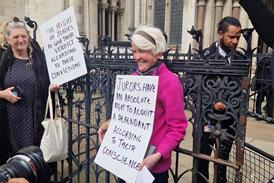The government has rejected a recommendation of the landmark Taylor review to reverse the burden of proof in employment tribunals where status is in dispute, amid accusations that ministers are stalling on reform of the so-called ‘gig economy’.
In a report commissioned by the prime minister, Matthew Taylor last year made more than 50 recommendations to reform employment practices. One was a requirement for employers to prove that an individual claiming employment rights is not entitled to them. At the moment, the employee must prove their entitlement.
In its official response, published last week, the government said this proposal would not be taken further for the moment. It claimed appropriate safeguards – including the use of the online tool to reach an initial determination of employment status – were not in place. It added that the Supreme Court ruling outlawing tribunal fees had enabled claimants to get ‘authoritative determination of status’ without paying a fee.
Anthony Purvis, partner at London firm Waterfront Solicitors, said: ‘Often, individuals struggle to challenge their employment status given the complexity of the arguments and the cost of securing a judgment. Taylor recommended online tools to assess status and, although they may provide helpful guidance, securing a judicial determination in order to enforce rights would still be required in most cases.
‘Given the difference in power and resources between companies and individuals, there are obvious social policy reasons for ensuring that individuals can obtain a binding assessment of their employment status in a straightforward manner. We are not there yet’.
Critics alleged that the government has effectively parked Taylor’s report by publishing four consultations asking multiple questions on potential reforms. Stephen Cavalier, chief executive of trade union firm Thompsons Solicitors, said its response offers ‘nothing but vague platitudes which don’t get to the heart of issue’.
Michael Hibbs, head of employment law at national firm Shakespeare Martineau, said: ‘Unfortunately, with Brexit dominating parliamentary time, it is unlikely that we will see the problems associated with employee working rights change any time soon.’


















![David Lester (senior partner at Blythe Liggins), Darryl Barnes, Jagdeep Sandher (head of dispute resolution at Blythe Liggins)[4]](https://d1d8vslyhr7rdg.cloudfront.net/Pictures/274x183/4/2/8/116428_davidlesterseniorpartneratblytheligginsdarrylbarnesjagdeepsandherheadofdisputeresolutionatblytheliggins4_981603_crop.jpg)





1 Reader's comment